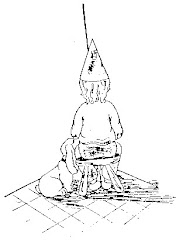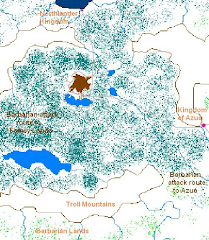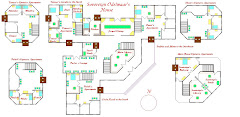In Book II we learn quite a bit about the Ceres and Elves. It probably isn't fair to make a post based on the second book in a series for which the first has yet to be published (and therefore is unavailable). However, what you will find is that the culture of the Ceres and Elves in Book II has a great many similarities to Khirsha's family culture. There are also some significant differences, which produces the comic thread in Book II.
I will try to keep this post focused on the topic listed in the title, but if you've been reading me at all you know I tend to wander about.
Although few human societies were gender equal, for the other four races 'equality' was common. Males and females had their basic roles, but the ability to branch from these was easy - providing cultural requirements were met. But for Figgits, Dwarfs, Pennans and Nomads, gender was not an exclusionary factor. In those four races we find ability and interest played a much bigger role in deciding one's role in their society. There were exceptions. Every society has its own quirks and prejudices which seem normal to it, but quite odd to others which do not share the quirk. So, since the Elves were the product of a Pennan and a Nomad, their society followed the same path.
Regarding marriage, courting and other things of that nature, the four 'equal' races chose practicality as their judgment rod. What does this mean? Well, like most cultures, the perpetuation of the culture was of foremost concern. This meant taking care of the citizens, or at least making sure the citizens were well able to take care of themselves. The ability to grow, or trade for, the things living required (food, clothing, shelter) was the primary factor. What about children? Well, depending on the society, children were able/required to work based on their age. They were the responsibility - not the possession - of their parents. This point is key, for it drove the decision on who would hold the final say in family matters.
Although each society had its own methods to attempt birth control, their effectiveness varied from 'why bother' to 'most of the time'. Only a very few cultures managed to find the 'most of the time' method, and that usually by luck. (Khirsha's family was one of those, and it was due mostly to luck - but whether good or bad is hard to tell. The Power of the ore in Fire Mountain leeched into the land and water and infected all living things within its range. One side-effect - for Khirsha's family anyway - was a reduction in birth rate.) This meant that females desiring a more - copulatory - relationship with a male ran the risk of becomming pregnant. Should this happen, they could not escape it. The pregnancy would be with them until the child/children were born. Males did not have this problem. They could leave, claiming they had nothing to do with the creation of this new offspring. It would be their word against the females. How was this to be resolved?
The answer became easy. Not wanting to have 'orphaned' children in large numbers, these societies (Nomads, Pennans, Dwarfs and Figgits) decided the female's voice would be heard - and no other. Now, there was no 'her word versus his word' scenarios. It was the female's word. And in virtually all of these societies, the consequence of creating a child was instant betrothal to the co-defendant.
So. Question. Does this mean that a woman, Nonkanta (not desired), could give herself to a man, Kert (simpleton), become pregnant, and then claim that Sohan (charming, handsome) was the father? (source of names: http://www.babynames.com/Names/search.php)
Yes.
It happened, but not nearly so much as imagination would allow. Generally, if a woman (young or otherwise) was willing to engage in this behavior it was because the male she had chosen to do it with was the male she had chosen. If there was any deception involved, it was in convincing the male to participate - but what kind of deception does a woman need for that?
Nonkanta: Hey, Sohan! Do you want to have sex with me?
Sohan: You bet! Let's do it!
For this reason, it was decreed the females would decide who they wanted to court, and the males would have to wait to be asked. The (absolutely correct) thinking was that the males would respond to overtures from virtually any female, whereas females were more selective in choosing mates. So the females got to choose.
One practice of the Ceres and Elves not practiced by Khirhsa's family was the concept of multiple spouses. It wasn't completely straightforward, however. In fact, the rules surrounding it could be quite convoluted - to an outsider. It made perfect sense to them.
In Cere and Elvish culture, having more than one husband, or more than one wife, was acceptable - if one belonged to a Royal House. And this is where the convolutions begin. Royal House membership was not necessarily lifelong, and it was possible to become Royal House through no effort. So what was a Royal House?
Simply put, belonging to a Royal House meant one could trace their lineage back to one of the current advisors to the king/queen, or to the king/queen or their spouse/s. Kings and Queens sometimes 'fired' advisors, replacing them with new members. But while one belonged to a Royal House, one had the right to pursue and acquire multiple partners. This included pursuing partners who were already married. Some of the social relationships were quite messy.
The number of Royal Houses at any given time was dependent on the population. Small populations meant for few Royal Houses while large populations meant the reverse.
Adding to the mess was the fact that one did not have to actually belong to a Royal House in order to participate in this benefit. Only one partner needed to belong to a Royal House. So, Royal House women could seek out males who were not Royal House. Further, non-Royal House women could seek out males who were. Remember, males could not seek out anyone. However, they could - within protocol - make it known to the females that they were available to court. This was done in a variety of ways, depending on the specific society. It is also what gets Khirsha into trouble in Book II.
So what happened to the extended households when Royal House status was removed? Nothing. No marriage could be annulled. Once it existed, it existed.
One last point on marriages. Excepting the case of marriage by pregnancy, all marriages had to be approved, generally by parents. In the case of multiple spouses, the spouses had to approve.
Example:
Woman1 is married to Man1.
Woman2 is married to Man2.
Woman3 is not married.
Man3 is not married.
Woman1 wants to make Man3 her Second Husband.
Man1 must approve.
Man3's parents must approve.
Woman2 wants to make Man1 her Second Husband.
Man2 must approve.
Woman1 must approve. (approval was given far more often than you might think)
Woman3 wants to make Man3 her First Husband, and Man2 her Second Husband.
Man3's parents must approve.
Woman2 must approve.
Convoluted? Messy? What about the children? Wouldnt' that be a mess when it came time for them to find partners?
Yes. It was a mess. But each society's members had no trouble keeping things in order.
The final approval required (except in cases of pregnancy) was the new couple's ability to provide for any/all projected children.
The marriage institution for Ceres and Elves was like a giant entanglement. This is the culture Khirsha is thrown into in Book II. His method for surviving within it is interesting.
Wednesday, December 31, 2008
Subscribe to:
Post Comments (Atom)
Today's Music
Yeah. That's The Great Sea all right.







No comments:
Post a Comment